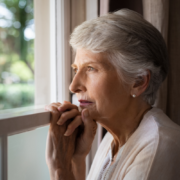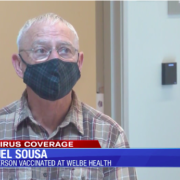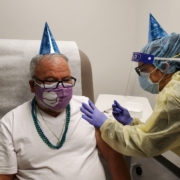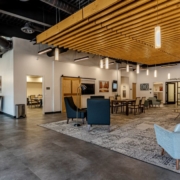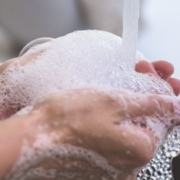UC Berkeley Study Reveals WelbeHealth’s Rapid Adaptation To COVID-19 Eldercare Yielded Exceptional Results And Saved Lives
As policy momentum grows toward home and community-based services, study recommends that policy choices focus on the Program of All-Inclusive Care for the Elderly (PACE), and it’s 45-year track record of success in serving the most complex elderly patients.
SILICON VALLEY, Calif., July 14, 2021 — A new study from UC Berkeley’s Berkeley Roundtable on the International Economy (BRIE) features WelbeHealth in a case study illustrating how this California eldercare PACE provider responded early and decisively to the COVID-19 crisis with exceptional results.
“By rapidly transforming its care model, WelbeHealth had exceptional results: as COVID-19 cases rose across the country — and in particular within nursing home populations — WelbeHealth did not have a single COVID-19 death during the first 8 months of the pandemic. The first WelbeHealth loss from COVID-19 occurred on November 21, 2020 and 10 WelbeHealth participants died of COVID-19 since the beginning of the pandemic.”
-UC Berkeley
READ THE STORY:
Welbehealth: Case Study of Adapting PACE Under COVID-19
Key findings:
- WelbeHealth and the PACE community overall had lower death rates than nursing homes; the national PACE COVID-19 death rate was 3.8%, nearly one-third the 11.8% death rate in nursing homes. WelbeHealth calculated a death rate of 2.4%.
- WelbeHealth acted early and decisively to minimize exposure with an Incident Command response strategy, dispersing tablets for telehealth visits, PPE, thermometers, food, medication, and other essentials into participants’ homes, and providing nearly all care remotely, which proved effective.
- PACE’s capitated payment model moves the risk from payor to care provider, aligning incentives and encouraging innovation and efficiency in keeping patients well.
- Technology provided an important amplification to PACE’s model of care — it allowed for regular check-ins and informed decision-making on care needs. However, the social aspect of the PACE day center cannot be replaced by technology, and it is clear that in-person visits are vital.
- With America’s senior citizen population set to double by 2040, the demand for long-term care will skyrocket. The pandemic underscored that work must begin now to meet the needs of present and future vulnerable elders.
- Existing home and community-based services (HCBS) such as PACE demonstrated profound success during the pandemic leading to fresh momentum among policymakers to expand these options further.
PACE’s person-to-person, fully integrated approach maintains the participant’s highest level of independence and quality of life[i]; PACE participants experience an 80% drop in rates of depression after joining.[ii] At a time when America is searching for a better way forward in eldercare, PACE is a proven approach for this vulnerable group.
“While PACE has a 45-year track record of success, it remains optional in Medicaid while nursing home benefits are required — it’s time for every vulnerable elder in the country to have access to this gold standard of long-term care,” said Elizabeth Carty, Chief Regulatory Affairs Officer of WelbeHealth.
Many PACE participants reside in medically underserved areas like San Joaquin County, California, where WelbeHealth’s creative problem-solving and speed to action kept seniors safe in their homes when resources for the elderly were relatively scarce.
“As other healthcare organizations were assessing the potential impact and spread of the pandemic, the WelbeHealth team had already taken its crisis response to the next level, ” said Amy Shin, former CEO of Health Plan of San Joaquin. “I was impressed with how nimbly this team charted out a plan not only to keep seniors safe and vaccinated but to vaccinate the community as well. This study’s findings should alert legislators that this style of home and community-based services is the ideal model of care for frail seniors.”
What is PACE?
PACE (Program of All-Inclusive Care for the Elderly) serves low-income seniors who meet their state requirement for nursing home level care allowing them to live independently in their own homes and communities while receiving fully coordinated medical and dental care, physical and occupational therapy, transportation, meals, day programs, home care assistance and more, managed by an 11-person integrated care team. The “one-stop-shop” PACE day centers are the hub of the program, offering seniors a pleasant place to receive care, socialize and enjoy meals within a state-of-the-art facility.
About WelbeHealth
WelbeHealth is a physician-led healthcare organization that provides seniors with high-quality, compassionate care so they can live in their own homes and communities rather than a nursing home. To accomplish this, WelbeHealth uses the PACE (Program of All-Inclusive Care for the Elderly) model. WelbeHealth currently operates four programs in the Stockton/Modesto, Pasadena/Burbank, Long Beach, and Fresno communities of California.
[i] Center for Consumer Engagement in Health Innovation, “Care That Works: Program for All-inclusive Care for the Elderly.” https://www.healthinnovation.org/resources/publications/care-that-works-pace
[ii] National PACE Association, “COVID Data Demonstrates That the PACE Model Is Safer Than Nursing Home Care.” https://www.npaonline.org/about-npa/press-releases/covid-data-demonstrates-pace-model-safer-nursing-home-care

